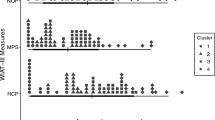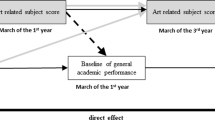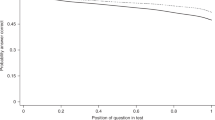Abstract
THE increasing pressure of academic specialization raises the question of whether we can discover a test of differential aptitude for advanced work in arts and science subjects respectively. In a preliminary study, the performance of a large number of Cambridge undergraduates on a test of high-grade intelligence (A.H.5) has been analysed, with special reference to relative ability on the verbal, numerical and diagrammatic sections of the test1,2. Two differential scores were calculated as follows: ‘Score A’, diagrammatic minus numerical plus verbal; ‘Score B’, diagrammatic plus numerical minus verbal.
This is a preview of subscription content, access via your institution
Access options
Subscribe to this journal
Receive 51 print issues and online access
$199.00 per year
only $3.90 per issue
Buy this article
- Purchase on Springer Link
- Instant access to full article PDF
Prices may be subject to local taxes which are calculated during checkout
Similar content being viewed by others
References
Heim, A. W., Brit. J. Psychol., 37, 70 (1947).
Heim, A. W., “Manual for the Group Test of High-Grade Intelligence A.H.5” (National Foundation for Educational Research, 1956).
Author information
Authors and Affiliations
Rights and permissions
About this article
Cite this article
HUDSON, L. A Differential Test of Arts/Science Aptitude. Nature 186, 413–414 (1960). https://doi.org/10.1038/186413b0
Issue Date:
DOI: https://doi.org/10.1038/186413b0
This article is cited by
-
Intelligence, Divergence and Potential Originality
Nature (1962)
Comments
By submitting a comment you agree to abide by our Terms and Community Guidelines. If you find something abusive or that does not comply with our terms or guidelines please flag it as inappropriate.



